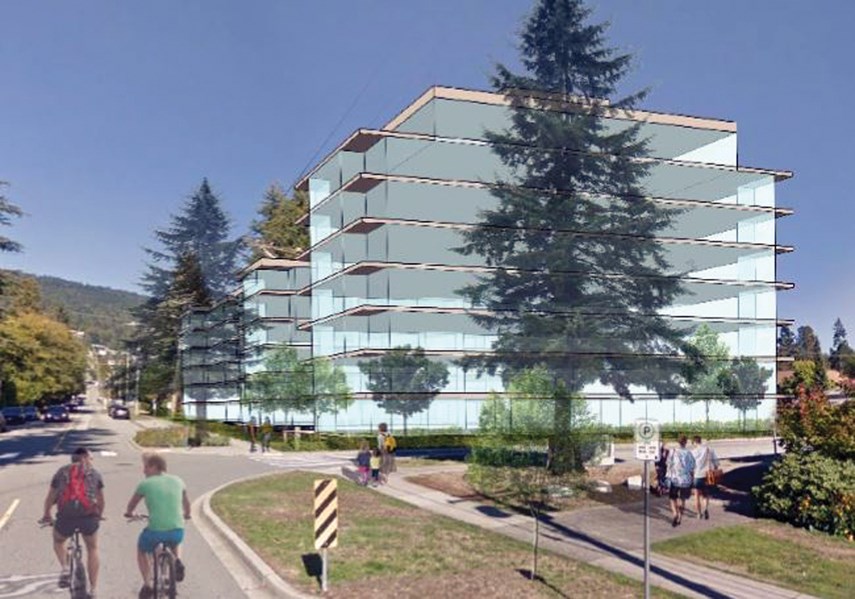The District of West Vancouver is plodding ahead with plans for a moderate-income housing project on municipally owned land.
The district purchased 2195 Gordon Ave. from Vancouver Coastal Health in 2014 for $16 million and earmarked the land for future affordable housing. On Monday night, council voted to advance plans for two six-storey, wood-framed rental buildings with 167 units offered at an average of 70 per cent of market rates, plus an eight-storey, 50-unit concrete strata building and 3,000-square-foot adult daycare.
Working people aged 25 to 34 currently only make up two per cent of West Vancouver and the municipality’s population is in decline, staff note.
Although many of the final details have not yet been worked out, the district is targeting households earning between $49,000 and $126,000, including local workers and families. People approved to live in the rentals would have to go through a means test.
Public consultation on the project has been ongoing since last fall. According to the district staff report, there is broad support for the proposal overall and no clear opposition from the closest neighbours.
If approved by council, the land would likely be subdivided into two lots – one for the strata building and the other for the two rental buildings – which the district would then rezone and put on the market for either a long-term lease or sale, though staff and council both indicated a lease would be more likely. The district estimates that would bring in $26 million in revenue.
“What you see before you is a plan that tries to achieve two broad but very different objectives – make a significant contribution to housing affordability in the form of the rental but also recover the amount you spent on the land plus a modest return on that,” said Jay Wollenberg, one of council’s lead consultants on the project.
The plan was roundly supported by people who came out to council to speak on Monday, including Patrick McLaughlin, president of the Kiwanis North Shore Housing Society, which operates a seniors’ facility next door.
“Right now, the moderate-income segment of our community needs your support most,” he said, noting 60 per cent of employees in West Van currently commute in. “That increases traffic congestion at best and at worst, makes it difficult for our businesses to find and retain employees. There is a definite need for this project, and the Gordon Avenue property is the right site, in terms of size and proximity to community services for working families.”
Don Peters, chairman of North Shore Community Resource Society’s Community Housing Action Committee said it was “nothing short of spectacular” and reminded council their official community plan directs them to create that kind of housing.
Those who did speak in opposition, however, said the site should be reserved exclusively for seniors housing and services, or questioned whether West Vancouver was really in need of new rental units. Others suggested the district seek out the maximum financial payout from the property (an estimated $80 million if rezoned and sold for luxury condos) and use the funds to acquire more affordable units elsewhere.
Council’s support was unanimous, however. Coun. Nora Gambioli beamed while rattling off the benefits that would flow from the project all at no risk to taxpayers.
“I challenge any municipality in the Lower Mainland to do this well,” she said.
Coun. Craig Cameron said the Community Charter compels municipalities to build the type of housing, but he added, there is also a moral imperative to make room for middle-class neighbours.
“There are few, few options for those people in this community and make no mistake, they are the people who make this community function. They are our teachers. They are our first responders. They are small business operators. They are dental hygienists,” he said.
Some on council had a more tepid response, including Couns. Marcus Wong and Sharon Thompson, both of whom questioned whether the district was getting the best bang for its buck on the land.
“It’s a beautiful project. It makes you feel good thinking about it. But have we gone far enough to optimize this site?” Thompson asked.
And Coun. Peter Lambur was quick to cast doubt that people working on teachers’ or caregivers’ salaries would be able to comfortably afford the proposed rents.
But Mayor Mary-Ann Booth said no project can be all things to all people. Instead, she said, council should press onward and tweak the model for future projects on other pieces of district-owned land.
“We considered over 100 different projects… We’ve owned the property for five years. The market has actually changed in that time, but one thing that hasn’t changed is West Vancouver has not gotten any more affordable for these middle-income people, a lot of them young people,” she said. “We’ve talked about this enough and it’s time to move forward.”
The district will now refine the proposal, come up with detailed designs, update estimates for the value of the land and commercial viability of the project and, eventually, prepare a rezoning application.



